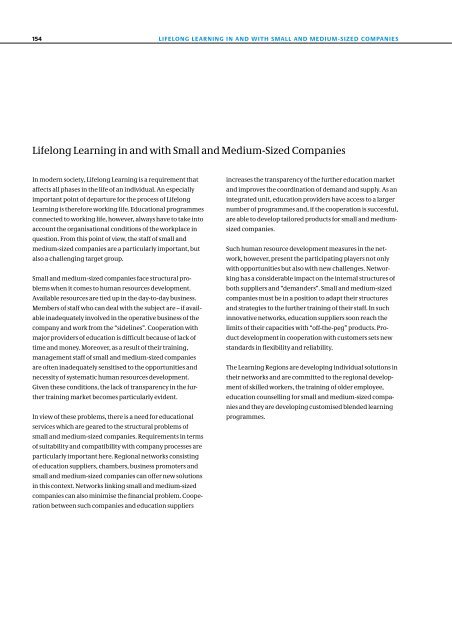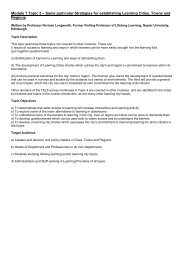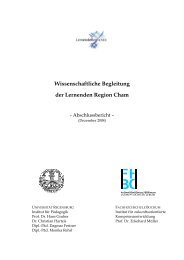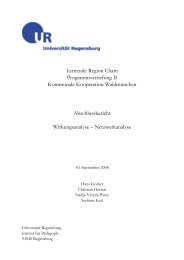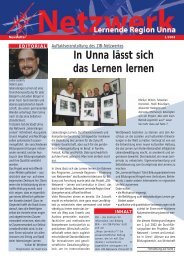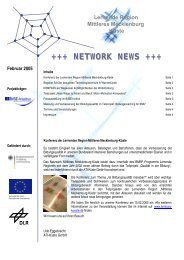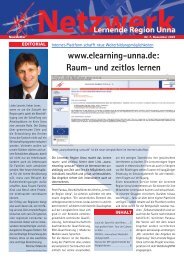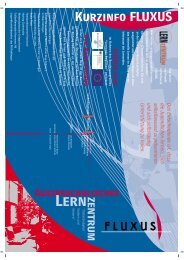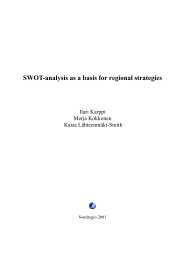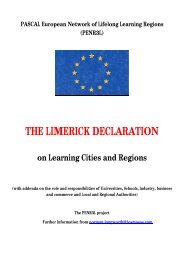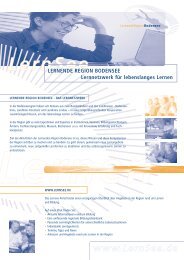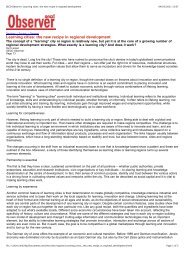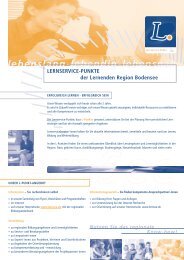Die Strategie für das Lebenslange Lernen ... - EUROlocal
Die Strategie für das Lebenslange Lernen ... - EUROlocal
Die Strategie für das Lebenslange Lernen ... - EUROlocal
Sie wollen auch ein ePaper? Erhöhen Sie die Reichweite Ihrer Titel.
YUMPU macht aus Druck-PDFs automatisch weboptimierte ePaper, die Google liebt.
154 LIFELONG LEARNING IN AND WITH SMALL AND MEDIUM-SIZED COMPANIES<br />
Lifelong Learning in and with Small and Medium-Sized Companies<br />
In modern society, Lifelong Learning is a requirement that<br />
affects all phases in the life of an individual. An especially<br />
important point of departure for the process of Lifelong<br />
Learning is therefore working life. Educational programmes<br />
connected to working life, however, always have to take into<br />
account the organisational conditions of the workplace in<br />
question. From this point of view, the staff of small and<br />
medium-sized companies are a particularly important, but<br />
also a challenging target group.<br />
Small and medium-sized companies face structural problems<br />
when it comes to human resources development.<br />
Available resources are tied up in the day-to-day business.<br />
Members of staff who can deal with the subject are – if available<br />
inadequately involved in the operative business of the<br />
company and work from the “sidelines”. Cooperation with<br />
major providers of education is difficult because of lack of<br />
time and money. Moreover, as a result of their training,<br />
management staff of small and medium-sized companies<br />
are often inadequately sensitised to the opportunities and<br />
necessity of systematic human resources development.<br />
Given these conditions, the lack of transparency in the further<br />
training market becomes particularly evident.<br />
In view of these problems, there is a need for educational<br />
services which are geared to the structural problems of<br />
small and medium-sized companies. Requirements in terms<br />
of suitability and compatibility with company processes are<br />
particularly important here. Regional networks consisting<br />
of education suppliers, chambers, business promoters and<br />
small and medium-sized companies can offer new solutions<br />
in this context. Networks linking small and medium-sized<br />
companies can also minimise the financial problem. Cooperation<br />
between such companies and education suppliers<br />
increases the transparency of the further education market<br />
and improves the coordination of demand and supply. As an<br />
integrated unit, education providers have access to a larger<br />
number of programmes and, if the cooperation is successful,<br />
are able to develop tailored products for small and mediumsized<br />
companies.<br />
Such human resource development measures in the network,<br />
however, present the participating players not only<br />
with opportunities but also with new challenges. Networking<br />
has a considerable impact on the internal structures of<br />
both suppliers and “demanders”. Small and medium-sized<br />
companies must be in a position to adapt their structures<br />
and strategies to the further training of their staff. In such<br />
innovative networks, education suppliers soon reach the<br />
limits of their capacities with “off-the-peg” products. Product<br />
development in cooperation with customers sets new<br />
standards in flexibility and reliability.<br />
The Learning Regions are developing individual solutions in<br />
their networks and are committed to the regional development<br />
of skilled workers, the training of older employee,<br />
education counselling for small and medium-sized companies<br />
and they are developing customised blended learning<br />
programmes.


